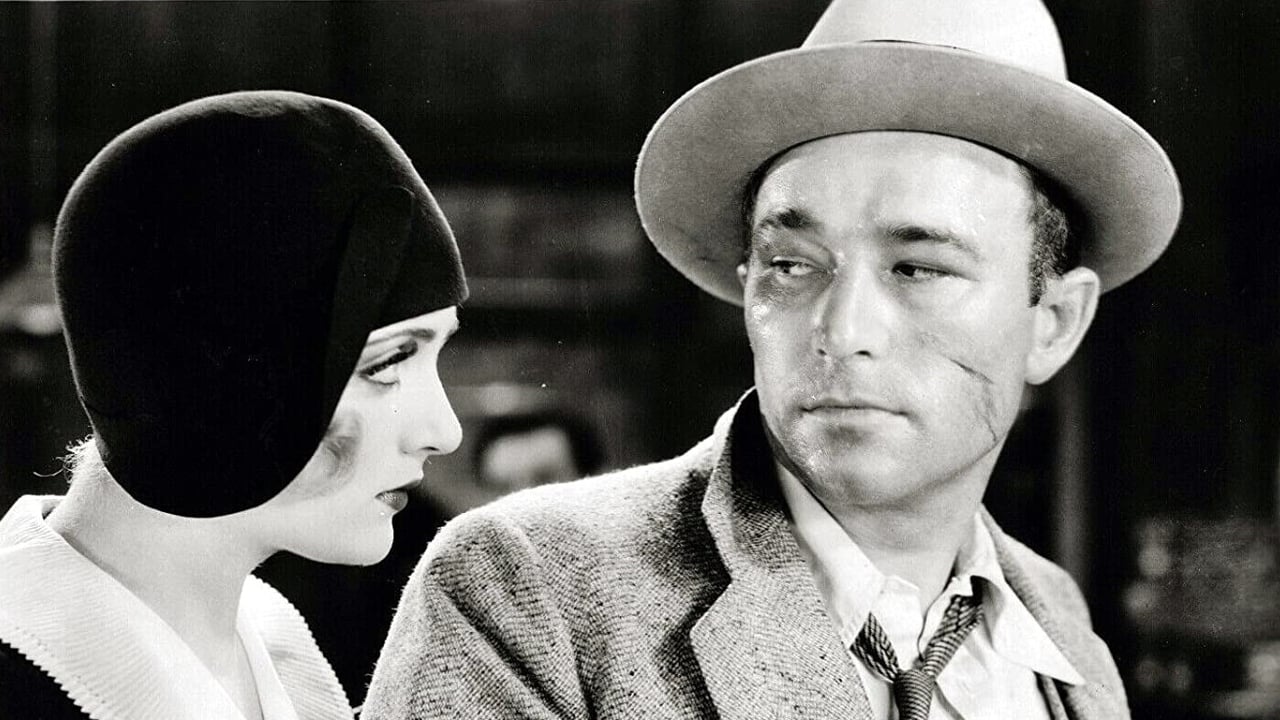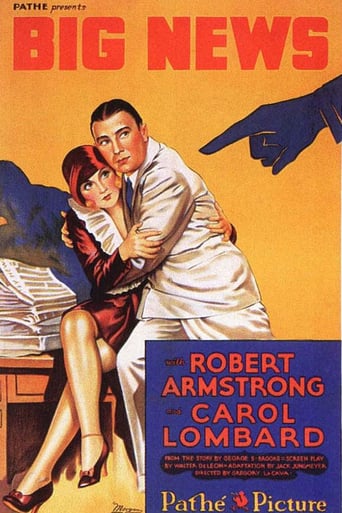ManiakJiggy
This is How Movies Should Be Made
NekoHomey
Purely Joyful Movie!
SpecialsTarget
Disturbing yet enthralling
Freaktana
A Major Disappointment
JohnHowardReid
Director: GREGORY LA CAVA. Dialogue director: Frank Reicher. Screenplay: Walter De Leon. Dialogue: Frank Reicher. Adapted by Jack Jungmeyer from the stage play by George S. Brooks. Photography: Arthur Miller. Production manager: Lucky Humberstone. Assistant director: Paul Jones. Sound recording: D.A. Cutler, Clarence M. Wickes.Copyright 26 September 1929 by Pathé Exchange. New York opening at the Colony: 5 October 1929. 7 reels. 6,028 feet. 66 minutes. Available on a 9/10 Grapevine Video DVD.COMMENT: Like the stage play, the whole action of the movie takes place on the one set. Admittedly, it's quite a large set, much bigger than a theatre could handle, but it's not very glamorous and does tend to out-stay its welcome. Nonetheless, I'm told that this is what a real newspaper office actually looked like back in 1929. More surprising still is the information that the reporters and their behavior are accurately depicted.
Certainly - with a notable exception - the movie is competently acted. The exception, sad to say, is Carole Lombard who does absolutely nothing with her role at all, and looks about as glamorous as a street cleaner. Maybe she could point a finger at the wardrobe mistress and photographer, Arthur Miller, for her drab appearance, but her lack of spark and animation can surely be blamed on the director, Gregory La Cava. Yet some years later, she and La Cava got together for a movie that turned out to be the highlight of both their careers - My Man Godfrey (1936). But while La Cava's handling here is no more than routine, cameraman Miller brilliantly overcomes many early talkie, sound-proof booth problems.
calvinnme
I'd give this one a 5/10 if it wasn't for some of the unique things going on. Some of it is just plain cheeky. For example, I think the name "Big News" was given to the film to confuse people with the play "Good News" that was made into a film the following year. The opening score even has some of the music from "Good News" in it, though cleverly disguised.This one is an early talkie, plus it apparently was made on the cheap at Pathe, so the entire film basically takes place in two rooms - The news room of driven but often drunken reporter Steve Banks (Robert Armstrong), and a speakeasy that is a front (it must be, there are never any customers!) for a drug dealing operation run by Joe Reno (Sam Hardy).Banks likes to go drinking with O'Neill (Wade Botellier), a drunken discredited and thus ex reporter, and Steve's absentee home life has his reporter wife (Carole Lombard as Margaret) coming to the newsroom to tell Steve she is calling their marriage quits. Meanwhile, Joe Reno is worried that Banks is going to expose his dope peddling operation, and calls the newspaper to say he's been drunk and disorderly and bothering the nonexistent customers at his completely illegal business. The paper fires him.Banks reacts by going to Reno's speakeasy with his drunken friend (WHY DOES HE NEED THIS GUY?) and HE ACTUALLY LETS HIM IN!!!. Reno then unintentionally tips his hand to Banks who gets the evidence he needs and writes up an expose on Reno's operation. This dawns on Reno AFTER Banks leaves.Banks has been fired. Reno knows this. For some reason he goes to where Banks used to work - Banks might have given the story to a completely different paper and never returned - and frames him for a crime of which he is easily absolved. Plus Reno is seen by everybody including Banks AND the cops AND everybody knows Reno had a motive to do what he did. What an idiot! I'll let you watch the terrible print that is available and see what happens.Why am I disrespecting Carole Lombard? Because she is a mere shadow of the actress she'll be just five years later. But part of it really isn't her fault. The lines she is given are ridiculous and actually sound like the stuff of title cards from the 1910s. She is either tall statuesque and silent or overacting hysterically. But she improves tremendously in just this year. Her next film, Racketeer, is much better. But you would never guess by this one performance that she is the member of the cast people are most likely to remember almost 90 years later.There is one weird angle that you would never see after the production code. I guess to fill up time there is a part for an overweight lonely hearts reporter - Helen Ainsworth as Vera - who dresses in men's' clothing and does a kind of risqué vaudeville comedy routine between scenes to lighten the mood. The paper editor warns her "Don't be gay on my time!". Only in the precode era, and probably only in this first full year of talking film. Recommended for the goofiness of it all.
arfdawg-1
Steve Banks is a hard-drinking newspaper reporter. His wife Margaret, a reporter for a rival paper, threatens to divorce him if he doesn't quit the drinking that is compromising his career. Steve pursues a story about drug dealers even when his editor fires him. When the editor is murdered, Steve is accused of the killing. But Steve has an ace up his sleeve that may save him from the electric chair. Does this sound like a comedy? That's where IMDb puts it. It's a weird and dumb movie.
joeshoe89
This adult (for it's day) themed drama of a hard drinking reporter (who is also hard brawling) Robert Armstrong and his wife Carol(e) Lombard who is also a reporter and wants to divorce him is faced paced and contains not only speakeasies and drinking but a plot about the murder of a drug addict and her dealer. The drug plot line doesn't really do much but make the whole thing a bit more sleazy. The killer is caught because he is recorded on a cylinder when he doesn't know it. The reporter's boss is the murder victim. The reporter is framed by the murderer who is there at the newspaper where he commits the crime while another one of the reporter's bosses is on the phone! All ends well when Carol(e) discovers that Armstrong has switched to tea from booze in his flask which leads to a loving happy ending (he gets a raise too!).

